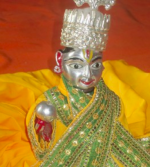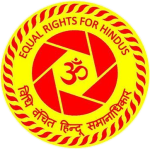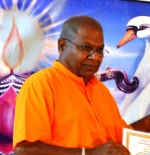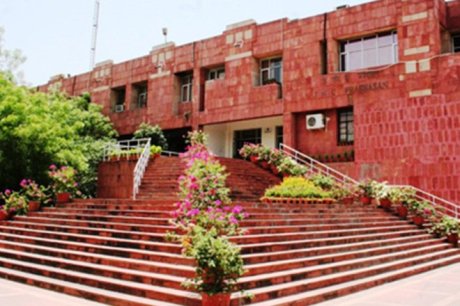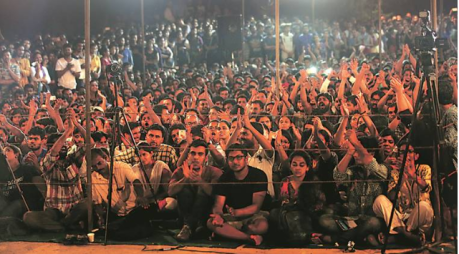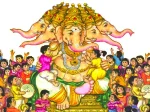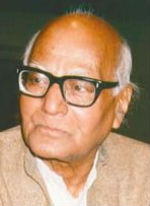 Now, if JNU, one of India’s foremost universities, refuses to teach Indian culture and yoga with the logic that it would lead to promotion of Hinduism in a secular country, then where else can one study Hinduism in India, where 80 percent of the population happens to be Hindus? – Prakash Nanda
Now, if JNU, one of India’s foremost universities, refuses to teach Indian culture and yoga with the logic that it would lead to promotion of Hinduism in a secular country, then where else can one study Hinduism in India, where 80 percent of the population happens to be Hindus? – Prakash Nanda
Jawaharlal Nehru University (JNU) is in the news again, but this time the national media has treated the news scantily. It has not paid enough attention to the fact that those who were agitating early this year to protect their right to dissent in JNU are now the suppressors of ideas coming from others who are not their “own”. For them, the university will do or practice what they want. It is they who will decide what is to be taught and how the university should be administered. Needless to say that these “dissenters” are mostly the so-called leftists and secularists; dissent for them means that they have the exclusive right to oppose things they do not like, but they deny the same right to those who disagree with them.
Anita Singh, a JNU professor, has told DNA that she was abused and attacked inside the university campus by a group of students, instigated by the Left-dominated students union and teachers association, while she stepped out of the meeting of the university’s statutory decision-making body, the academic council (AC), late on 7 October. Abused as a “sanghi”, Singh, who is the dean, School of Law and Governance, told the paper that she earned the students’ ire because, “I had presented the proposal for introducing a disaster research programme in the university for a trans-disciplinary programme, the talks for which have been going on since 2011, and that has already been passed by five standing committees. But the JNUSU thinks that any new innovation is ‘bhagwakaran’ (saffronisation) and I was attacked as soon as I stepped out.”
Singh has spoken about the events that took place outside the AC meeting. But what happened inside the AC meeting was equally gratuitous. Here, in the name of “secularism”, the majority rejected a proposal of the University Grants Commission (UGC) of introducing three short-term courses in Indian culture and yoga. According to the UGC’s proposed draft, the course on Indian culture aimed at expounding the importance of the country’s culture as well as exploring the etymological, social, spiritual, cultural and mythological aspects and establishing Indian values in the world. “The course will contain the texts, thoughts and traditions of different cultures and include things like religious systems in Indian culture among others. Besides, it will have portions from Vedas and selections from epics and Jatakas and suggestions on readings of Hindu epics like the Ramayana,” the draft read. It was argued in the draft that Indian culture cannot be understood without the help of “Indian literature, which is generally written by sages”.
Now, if JNU, one of India’s foremost universities, refuses to teach Indian culture and yoga with the logic that it would lead to promotion of Hinduism in a secular country, then where else can one study Hinduism in India, where 80 percent of the population happens to be Hindus? And here, I came across a report in The Hindu, dated 13 July, 2013, that said that one Subadra Muthuswami, who had a Master’s degree in public health from Columbia University, hoped to pursue her interest in Hinduism when she returned to India. “Since I am in India, I decided to do research to understand why we practice rituals and rites in Hinduism. But I understand that no university offers a comprehensive course in Hinduism studies,” she told the paper.
 Subadra discovered that the University of Madras had programmes in Vaishnavism and Indian philosophy, but not on “Sanatan Dharma” (Hinduism) as a whole, even though the university “has separate departments for Christian and Islamic studies”. She was told by senior professors that “universities are secular places where Hinduism as a religion cannot be taught. Sources in the university said when the department wanted to offer a paper in yoga (which is also a shastra) last year, the move was opposed on the grounds that it was endorsed by a political party.”
Subadra discovered that the University of Madras had programmes in Vaishnavism and Indian philosophy, but not on “Sanatan Dharma” (Hinduism) as a whole, even though the university “has separate departments for Christian and Islamic studies”. She was told by senior professors that “universities are secular places where Hinduism as a religion cannot be taught. Sources in the university said when the department wanted to offer a paper in yoga (which is also a shastra) last year, the move was opposed on the grounds that it was endorsed by a political party.”
One fails to understand that how a university that has departments on Christian and Islamic Studies considers offering a paper on yoga, let alone Hinduism, will tarnish its secular character. As a result, in India one can study Hinduism—and this was what Subadra discovered—only in private or spiritual organisations like Swami Shivananda Institute, Chinmaya Mission, Iskcon and Vedanta Academy (Mumbai).
In contrast, let us [look at] the situation abroad. I just did a Google search to find western universities offering courses on Hinduism and Indian culture. And this was what I found. The Oxford Centre for Hindu Studies is a recognised “independent centre” of Oxford University. The principal aim of the Centre is “the study of Hindu culture, religion, languages, literature, philosophy, history, arts and society, in all periods and in all parts of the world.” Cambridge University teaches Vedanta, Vyakarana and Sanskrit philosophy along with Buddhism. London’s School of Oriental and African Studies offers courses on “Indian philosophy, especially Vyākaraṇa and Mīmāṃsā, Sanskrit philology, Sanskrit scientific literature.” In fact, many British universities such as Sussex, Manchester, Leeds and Edinburgh have departments on Theology and Religious Studies that teach, among others, “Sāṅkhya and Pātañjala Yoga.” Sweden’s Stockholm University has courses on Indian Philosophy, especially “Nyāya and Buddhism.” In Brussels (Belgium), “Vrije Universiteit” (Antwerp FVG: Faculty for Comparative Study of Religions) teaches Hinduism, Buddhism, Sikhism, Jainism, Indian Philosophy, especially “Vedānta schools and Kaśmīr Śaivism.” University of Vienna (Institute of South Asian, Tibetology and Buddhist Studies) has programmes on “Sanskrit philosophy, Āyurveda and Sanskrit philology.” There are many universities and institutes in Germany that give special emphasis to Sanskrit, Indian philosophical texts and Indian religions, including “Veda, Pāli and Epics”.
Coming to the US, Concordia University has a chair in Hindu Studies that is dedicated to the interdisciplinary study of Hinduism. There is the J. Newton Rayzor Chair in Philosophy and Religious Thought at Rice University that studies Hinduism. Case Western Reserve University has a department on South Asian religions. So has also Emory University. Then there are famous professors like Wendy Doniger at the University of Chicago who has written many books on Hinduism, some of them controversial though.
 The questions that emerge from the illustrated list (not exhaustive) above are this: Are these western educational institutions having departments of theology and offering courses on comparative religions communal? If not, how can the Indian institutions offering courses on Hinduism or related subjects like yoga be branded communal, that too in a country where 80 percent of the people happen to be Hindus? And thirdly, if our “secularists” consider the book on Hinduism (which has shown the religion in negative manner) by American Indologist Wendy Doniger, a Professor of “Religions” in an American university, a great scholarly work, why cannot they promote similar scholarly works in Indian universities? Is it not double standards to applaud work on Hinduism by foreign scholars in foreign universities but deny the Indian scholars to work on the same subject in Indian universities?
The questions that emerge from the illustrated list (not exhaustive) above are this: Are these western educational institutions having departments of theology and offering courses on comparative religions communal? If not, how can the Indian institutions offering courses on Hinduism or related subjects like yoga be branded communal, that too in a country where 80 percent of the people happen to be Hindus? And thirdly, if our “secularists” consider the book on Hinduism (which has shown the religion in negative manner) by American Indologist Wendy Doniger, a Professor of “Religions” in an American university, a great scholarly work, why cannot they promote similar scholarly works in Indian universities? Is it not double standards to applaud work on Hinduism by foreign scholars in foreign universities but deny the Indian scholars to work on the same subject in Indian universities?
In fact, as the recent development in JNU has proved once again, our so-called liberals and seculars, who dominate the country’s education system, will leave no stone unturned to foil any attempt by any university in India to introduce courses on “Religions”. They will have nothing to do with the promotion of a “dead language” such as Sanskrit. Even any elective, repeat elective, course on “Vastu Sashtra” will be dismissed (as it happened in a Madhya Pradesh university some years ago) as attempts towards “saffronisation”. But minorities can pursue studies on their respective religions. As a result, what we see today is that the Muslims children learn about Islam and the Quran in madrasas and the Christian children learn the essence of Christianity and the Bible in educational institutions founded and managed by them. Under the Indian Constitution, the minorities are allowed to have their own educational institutions and the certificates or degrees thereof are recognised legally.
In contrast, the children of the majority of the Hindu community do not have such facilities. Even at the school-level, whenever there are attempts to teach the children about the Ramayana, the Mahabharata or the Gita, the “secular brigade” makes a lot of hue and cry. And ironically, all these elements, who dominate the Indian academia and media, will want books critical of Hinduism to flourish in India but they will advise against the circulation of anything that is critical of other religions.
Such are their double standards!
» FirstPost, 12 October 2016: Prakash Nanda is editor of Uday India, a national weekly, and Geopolitics a niche monthly devoted to defence, security and diplomacy. Previously he was a National Fellow at the Indian Council of Historical Research. He has also been a Visiting Professor at Yonsei University, Seoul and FMSH, Paris.
Filed under: india | Tagged: anti-national, free speech, india, indian politics, indian universities, JNU, left vs right, marxism, nationalism, politics, psychological warfare | Leave a comment »


